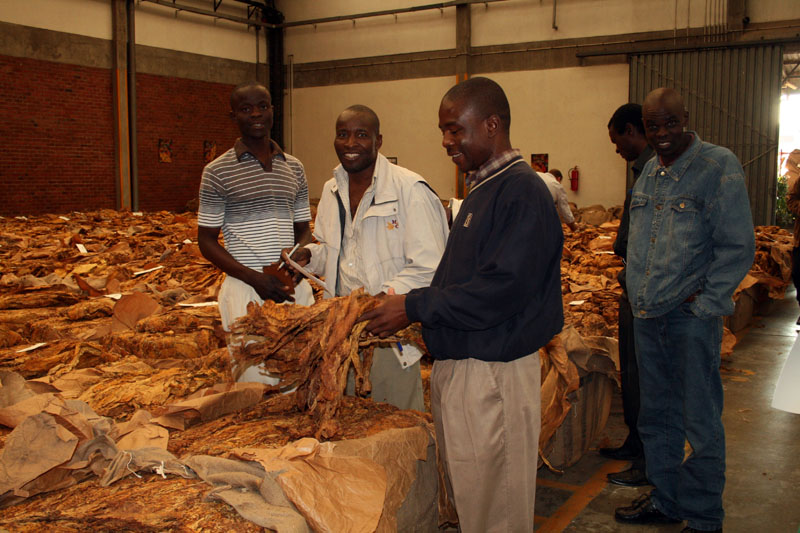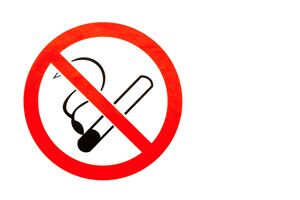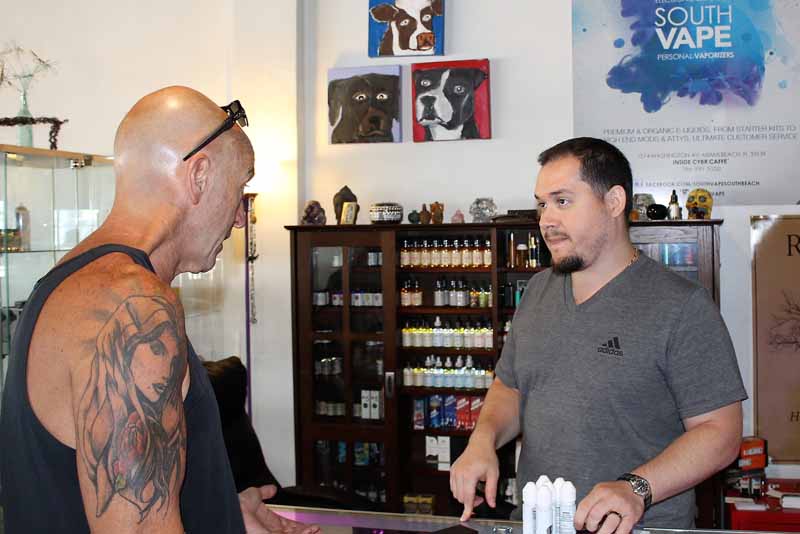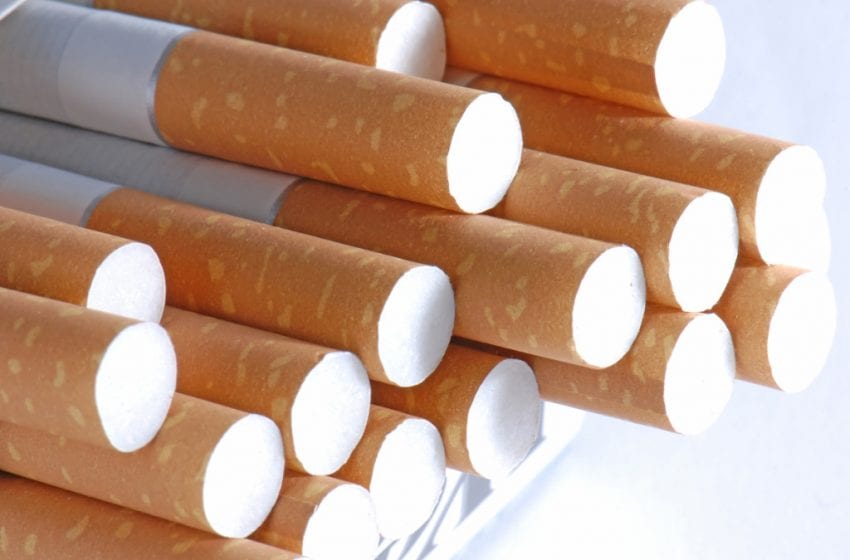Zimbabwe’s flue-cured tobacco growers are being encouraged to diversify into other high value export crops such as chia, oil seed and cigar tobaccos, according to a story in The Chronicle.
Although flue-cured tobacco is one of Zimbabwe’s major foreign currency earners, cigarette-tobacco consumption is seen as being under threat in some countries from products such as electronic cigarettes.
The Tobacco Industry and Marketing Board (TIMB) corporate communications manager, Isheunesu Moyo, said yesterday the promotion of chia production among tobacco farmers was meant to ensure growers had an all-year-round source of income.
Moyo said that farmers were being trained to grow chia and to engage in horticultural.
Chia, he added, was an ideal crop for diversification since its seeds were in demand abroad and it therefore had good potential as a foreign currency earner.
TIMB has had all its field and technical officers trained in chia production so that they can impart the necessary skills and knowledge to tobacco farmers.
Category: People

Growers told to diversify

'Absolute ban' proposed
János Lázár, the Hungarian prime ministerʼs commissioner for protecting non-smokers, has said he will propose a complete ban on buying tobacco products for anyone born in Hungary after January 1, 2020, according to a story in The Budapest Business Journal citing the Hungarian news agency MTI.
Lázár, who headed the Prime Ministerʼs Office during the previous term of the governing Fidesz-KDNP alliance, was speaking at the Tobacco Hungary conference in Siófok.
He said Hungaryʼs basic law could be modified if necessary.
The absolute ban would aim at Hungary becoming “the first smoke-free country in the world,” he added.
In the meantime, the commissioner said he would propose banning smoking in vehicles and giving condominium communities greater freedom in restricting smoking.
However, Hungaryʼs Government Information Center (KTK) told MTI that the cabinet had not discussed the ban as Lázár had not officially submitted any such proposal.
They had a plan but …
The US Food and Drug Administration is considering prohibiting the sales of some vapes in convenience stores, according to a story by Jim McDonald for Vaping360 quoting the agency’s Commissioner Scott Gottlieb.
The agency might also restrict online sales, as Gottlieb has already threatened, to try to stem what Gottlieb regularly calls an “epidemic” of teenage vaping.
“We have a sense of where we’re going to be heading from a policy standpoint,” Gottlieb told CNBC’s Squawk Box program.
“We have a problem with access. These products are too accessible to kids. And we have a problem with appeal. These products are too appealing to kids right now. And it’s mostly the cartridge-based e-cigarette products. The open-tank products that you might find in a vaping store aren’t generally used by kids.”
McDonald pointed out that that position was a reversal from the concerns expressed by the agency in its 2016 Deeming Rule. In creating that document, the FDA had carefully plotted a course to cripple and then destroy the open-system vaping market, while encouraging manufacturers to pursue products like pod vapes or cartridge-based systems.
The new plan, meanwhile, would restrict sales in the places smokers are most likely to see and buy vaping products: stores that also sell cigarettes.
Gottlieb said that vape shops seemed to be doing a better job than c-stores and other tobacco sales channels at verifying ID.
Gottlieb seemed to indicate that flavored products might be allowed in vape shops if they were “adult-only.” Such a requirement would require rulemaking by the agency, or legislation in Congress.
The FDA would have to have an objective standard for which flavors – or flavor descriptors – would be allowed in traditional retail channels.
But they would likely face lawsuits from retailers, who would object to an arbitrary rule that prevented only certain stores from selling legal products.
Smoking incidence down
The Government of South Korea has credited the country’s anti-smoking campaign for having brought about a fall last year in the incidence of tobacco smoking among men aged 19 or older, according to a Yonhap News Agency story.
The incidence of smoking among men had decreased ‘substantially’ in 2017, the Ministry of Health and Welfare said yesterday, without providing figures.
The ministry is set to provide figures in its annual report in November.
South Korea’s population-wide smoking rate fell from 47.8 percent in 2008 to 40.6 percent in 2015. The smoking rate increased to 40.7 percent in 2016.
In January 2015, South Korea increased the price of cigarettes by 80 percent, from 2,500 won (US2.25) per pack to 4,500 won per pack, in an effort to curb smoking. And annual sales of cigarette packs duly dropped from 4.36 billion packs in 2014 to 3.32 billion packs in 2015; and though they rebounded to 3.66 billion packs in 2016, they dropped again to 3.44 billion packs last year.
In 2016, the government forced tobacco companies to include graphic warnings on the upper part of both sides of cigarette packs.
The Government has since said it plans to add 12 new graphic warnings, which, from December 23 will have to be included also on heated-tobacco products.
A THR 'backwater'
Vaping groups in the Philippines are calling for the adoption there of the UK’s approach to tackling tobacco use, according to a story at businessmirror.com.ph.
The groups referred to a recent UK House of Commons Science and Technology Committee report, E-cigarettes, that said these products were estimated to be 95 percent less harmful than conventional cigarettes.
The report recommended in part that: ‘Regulations should be relaxed relating to e-cigarettes’ licensing, prescribing and advertising of their health benefits’. ‘Their level of taxation and use in public places must be reconsidered,’ the report said.
“E-cigarettes are helping many people in the UK quit smoking,” said Peter Paul Dator, president of The Vapers Philippines. “The government should seriously consider the UK tobacco control model in order to reduce the harms caused by conventional cigarettes to Filipino smokers.”
Meanwhile, Philippine E-Cigarette Industry Association president Joey Dulay said that the Philippines would remain a backwater in tobacco harm mitigation if the Department of Health continued its ill-informed and myopic position on e-cigarettes.
“It’s high time that the Department of Health take its cue from the UK and other countries that have acknowledged the growing body of scientific evidence supporting e-cigarettes and tobacco harm reduction,” he said during a forum held in Quezon City last week.
Menthol ban studied
A ban on menthol cigarettes brought in by a Canadian province did not trigger a rise in the sales of illegal cigarettes that was predicted by the tobacco industry, according to an American Cancer Society (ACS) story published by HealthDay and citing a new study.
The story said that when Nova Scotia became the first jurisdiction in the world to ban menthol cigarettes in May 2015, the ‘tobacco industry’ claimed that “the primary effect of this law will be to increase the illegal tobacco market in Nova Scotia”.
To determine if that were true, study author Michal Stoklosa, an economic and health policy research scientist at the ACS, analyzed Nova Scotia government data from 2007-2008 to 2017-2018.
His study found a large decrease in the number of seized illicit cigarettes of any kind, from more than 60,000 cartons in 2007-2008 to just under 10,000 cartons in 2017-2018. Most of this decline occurred in the late 2000s, which was said to suggest that there was no link between seizures and the menthol cigarette ban.
There was no statistically significant difference in the number of cigarettes seized before and after menthol cigarettes were banned, according to the researchers.
“This indicates that illicit cigarette sales in the province are similarly unlikely to be increasing,” Stoklosa was quoted as saying in an ACS news release.
“Indeed, Nova Scotia tax authorities estimate that the prevalence of illegal tobacco in the province has actually decreased, from 30 percent of all tobacco consumed in 2006-2007 to less than 10 percent in 2016-2017.”
The study findings were published on October 11 in the journal Tobacco Control.
Ban defies logic
A commentator writing in the South China Morning Post has questioned the rationale behind a recently-announced ban on electronic cigarettes in Hong Kong.
Stephen Vines said that one thing no one had expected from Chief Executive Carrie Lam Cheng Yuet-ngor’s policy address of last week was a frontal attack on Hong Kong’s long-standing commitment to free and open markets.
However, in announcing a ban on the sale of e-cigarettes, she had delivered a mighty blow to this commitment, while providing a rationale that defied logic.
‘The ban is based on some seriously flawed arguments if indeed, as claimed, it has arisen from public health concerns,’ Vines said.
‘Those promoting the ban have overexcitedly argued that vaping either poses a greater health risk than tobacco consumption, or is just as bad. They have focused their concern on the attraction e-cigarettes hold for the young and cited controversial evidence that vaping does nothing to reduce tobacco consumption.
‘Even if all these arguments are valid on health and social grounds – a bit of stretch, but let’s go with it for the moment – there is a fundamental illogicality here.
‘If vaping is just as bad or almost as bad as smoking tobacco why on earth has the sale of tobacco products not been banned? If e-cigarettes present a particular threat to the health of young people, why is nothing being done to eliminate much greater, proven health risks involving products targeted at young people that are full of carbohydrates and unsaturated fats – not forgetting the menace of monosodium glutamate that is heavily used in Hong Kong?’
The full comment is here.
Vaping not banned entirely
Malaysia’s deputy health minister Dr. Lee Boon Chye says the country’s new ban on tobacco smoking in public places does not cover vaping, according to a story by John Bunyan at malaymail.com.
Lee said that under current laws, the authorities could act only in respect of vaping products that contained nicotine; the unauthorized sale of which was illegal under the Drug Act.
Only vaping products that contained nicotine were illegal. There was no law banning vaping products that did not contain nicotine.
But Lee said the Government was looking to draw up a new law to control vaping – presumably vaping without nicotine.
On Friday, Lee announced that the government would ban smoking at all eateries, including open-air outlets, throughout the country from next year.
“Eateries that allow customers to smoke despite the ban will be fined up to RM2,500, while those who smoke at prohibited places will face a maximum fine of RM10,000 or two years’ jail,” he said.
He also reiterated a suggestion that Parliament’s smoking room should be closed by next month in a bid to turn the entire law-making house into a smoke-free zone.
“We should not be giving exemptions to parliamentarians as we have already legislated that all government premises should be smoke-free,” Lee said.
“We advise the parliamentarians who smoke to quit smoking if possible or if they find it hard, then they should try another option such as nicotine gum.”
Winning slowly but steadily
The solution to failure is not to redouble your efforts, but to change course, according to a story by Sinclair Davidson published in The Nation.
Davidson, who is a professor of economics at RMIT University in Melbourne, Australia, said that, during the past 10 years, Thailand had attempted to curb smoking by enlarging the size of picture health warnings on cigarette packs repeatedly. Now, the gruesome photos covered up to 85 percent of packs, yet the number of Thai smokers was increasing.
‘This incongruence ought to give Thai authorities pause to consider new ways to cut smoking,’ he said.
‘The most successful policies globally have usually been slow but steady – public education about health effects tends to discourage older smokers while cost and taxation tend to discourage youth from taking up the habit.’
Davidson said a better solution for Thailand would be to emulate Japan’s emphasis on education, teaching children from an early age about the dangers of smoking.
‘It is not a quick fix, of course,’ he said. ‘But if Thailand wants to lower the prevalence of smoking it should not follow the fashionable, but failed, plain packaging policies of Australia, France and the UK.’
But the UK was seen to provide one positive example. ‘The single largest contributor to reduced smoking rates in the UK – until the failed plain packaging policy was adopted – was the mainstreaming of electronic nicotine delivery devices,’ he said. ‘Alternate mechanisms to deliver nicotine to smokers sees many smokers substitute away from combustible tobacco products to safer products and in some cases to quitting altogether.’
Filters proposal unworkable
British American Tobacco says that an EU proposal to ban certain single-use plastics amounts to a laudable goal but one that is not entirely workable in its present form, according to a story by Martin Banks for The Parliament Magazine.
Banks reported that a parliamentary committee last week adopted a report by Belgian MEP Frederique Ries that aims to curb litter comprising the single-use plastics most commonly found on Europe’s beaches.
Under the draft rules backed by the environment committee, single-use plastic items such as plates, cutlery and cotton buds, which make up more than 70 percent of marine litter, would be banned.
Giovanni Carucci, vice president of EU Affairs with BAT, was said to have told the Magazine that reducing the environmental impact of single use plastics was a laudable goal.
“We are committed to reducing our environmental impact across our supply chain,” he said. “While we need time to analyse the full impact of the proposal, what I can say is that in its current form, it is not entirely workable.
“As the Commission acknowledges in its own impact assessment, today an alternative for cigarette filters that is as effective as cellulose acetate does not exist.
“We’ve researched alternatives for years, including collaborating with sustainable filter start-ups and other external companies, however none of the alternatives match the performance of cellulose acetate and will likely be in breach of the requirements of the Tobacco Products Directive (TPD).
“This makes the Parliament’s proposed consumption reduction targets a de facto ban on cigarettes, which is not in the scope of the Single Use Plastics Directive.”
Carucci said also that labeling aspects of the proposal would conflict with existing tobacco-labeling requirements, and that the proposals could involve the tobacco industry and member states in disproportionate costs and complexity.
Meanwhile, a commission spokesman was quoted as saying that more than 80 percent of marine litter comprised plastics. “Plastic residue is found in marine species – such as sea turtles, seals, whales and birds, but also in fish and shellfish, and therefore in the human food chain,” he said.
“While plastics are a convenient, adaptable, useful and economically valuable material, they need to be better used, re-used and recycled.”
Banks said that the Ries’ report would be put to a vote by the ‘full plenary’ in its 22-25 October session in Strasbourg.










